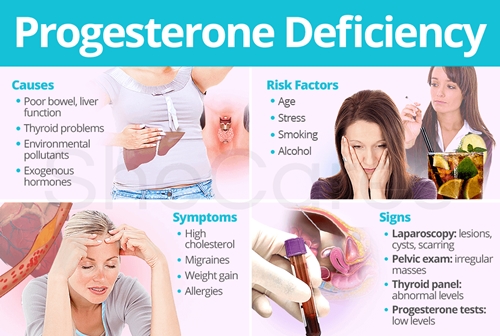Low progesterone
What is progesterone?
Progesterone is a female sex hormone. It’s produced mainly in the ovaries following ovulation each month. It’s a crucial part of the menstrual cycle and maintenance of pregnancy. Progesterone helps to regulate your cycle. But its main job is to get your uterus ready for pregnancy. After you ovulate each month, progesterone helps thicken the lining of the uterus to prepare for a fertilized egg. If there is no fertilized egg, progesterone levels drop and menstruation begins. If a fertilized egg implants in the uterine wall, progesterone helps maintain the uterine lining throughout pregnancy. Progesterone is necessary for breast development and breastfeeding. It complements some effects of estrogen, another female hormone. It also works with testosterone, the precursor for adrenal hormones. Men produce a small amount of progesterone to help in sperm development.

Picture courtesy of: shecares.com
|
Progesterone is important during childbearing years. If you don’t have enough progesterone, you may have trouble getting or staying pregnant. After one of your ovaries releases an egg, your progesterone levels should rise. Progesterone helps the uterus thicken in anticipation of receiving a fertilized egg. If it’s not thick enough, the egg won’t implant. Symptoms of low progesterone in women who aren’t pregnant include:
Low progesterone may cause abnormal uterine bleeding in women who aren’t pregnant. Irregular or absent periods may indicate poorly functioning ovaries and low progesterone. If you get pregnant, you still need progesterone to maintain your uterus until your baby is born. Your body will produce this increase in progesterone, which causes some of the symptoms of pregnancy, including breast tenderness and nausea. If your progesterone levels are too low, your uterus may not be able to carry the baby to term. During pregnancy, symptoms of low progesterone include spotting and miscarriage. Low progesterone may indicate ectopic pregnancy. This can result in miscarriage or fetal death. Without progesterone to complement it, estrogen may become the dominant hormone. This may cause symptoms including:
A progesterone test (PGSN) can help your doctor tell if your progesterone levels are too low. This is a simple blood test that doesn’t require any preparation. |
| Herbal remedies beneficial to progesterone | |||||||
|
|||||||
|
|
|
|||||||||||||||
|
|

